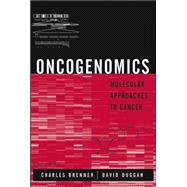
Note: Supplemental materials are not guaranteed with Rental or Used book purchases.
Purchase Benefits
What is included with this book?
Charles Brenner is Director of the Cancer Mechanisms Program at Dartmouth's Norris Cotton Cancer Center in New Hampshire. He trained in yeast molecular biology with Anthony Brake at Chiron and yeast genetics with Kunihiro Matsumoto at DNAX before earning his Ph.D. in the biochemistry department at Stanford with Robert Fuller. In 1993, as a Leukemia Society Fellow, Brenner moved to Brandeis to train in X-ray crystallography with Gregory Petsko and Dagmar Ringe and then took an independent position at the Kimmel Cancer Center at Jefferson in 1996. Brenner rose to head the KCC's Program in Structural Biology and Bioinformatics in 2000 and joined Dartmouth Medical School's faculties of Genetics and Biochemistry in 2003. Dr. Brenner's research group uses genetics, enzymology and X-ray crystallography to dissect the cellular pathways perturbed by loss of the FHIT tumor suppressor gene, which is lost early in the development of many tumors of epithelial origin.
David Duggan received his Ph.D. in 1997 in Human Genetics at Pittsburgh and trained with Jeffrey Trent in microarray analysis of breast and prostate cancer from 1998 to 2000 at the National Human Genome Research Institute. Duggan then served as an associate investigator at the National Institute of Arthritis and Musculoskeletal and Skin Diseases until 2003 when he took his current position at the Translational Genomics Research Institute in Arizona. Dr. Duggan's laboratory uses SNP genotyping and microarray analysis to investigate the genetic basis of human diseases.
|
|||
|
|||
|
|||
|
|||
|
|||
|
|||
|
|||
|
|||
|
|||
|
|||
|
|||
|
|||
|
|||
|
|||
|
|||
|
|||
|
|||
|
|||
|
|||
|
|||
|
The New copy of this book will include any supplemental materials advertised. Please check the title of the book to determine if it should include any access cards, study guides, lab manuals, CDs, etc.
The Used, Rental and eBook copies of this book are not guaranteed to include any supplemental materials. Typically, only the book itself is included. This is true even if the title states it includes any access cards, study guides, lab manuals, CDs, etc.